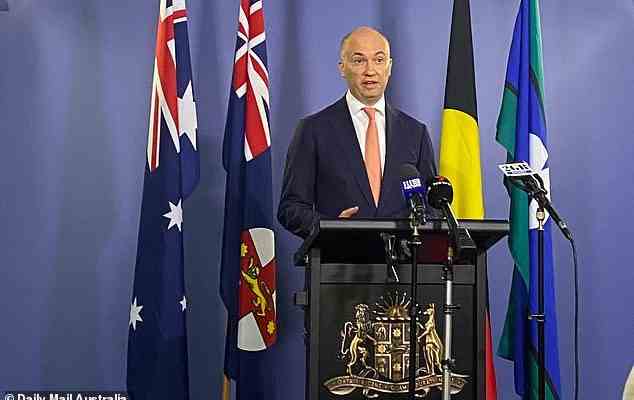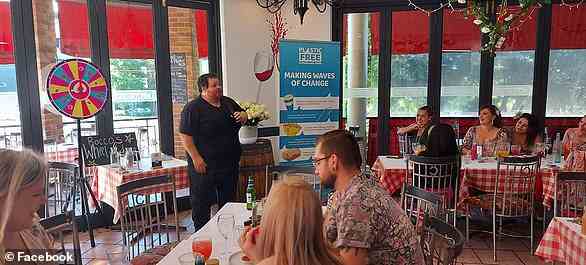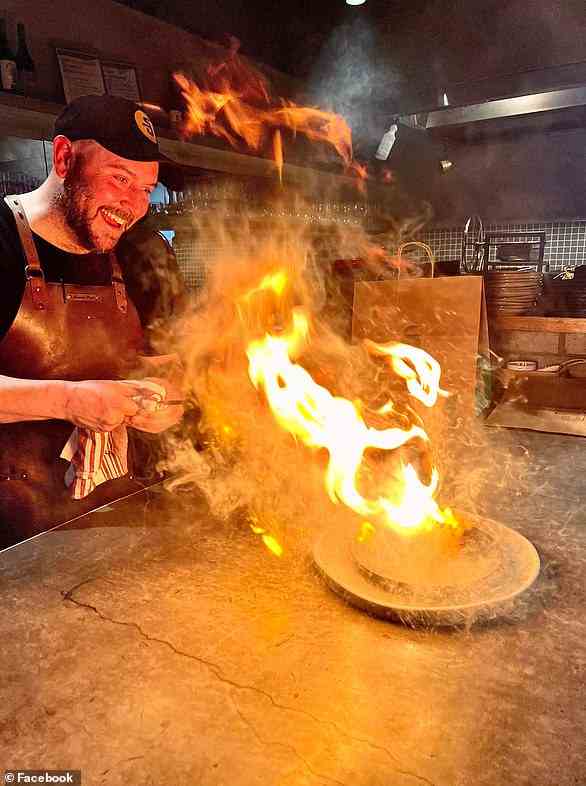NSW Energy Minister Matt Kean has laid the blame of surging energy costs at the feet of everyone but his own party.
As taxpayers across NSW, Victoria, Queensland and South Australia are warned to brace for energy bill spikes of between 20 and 31 per cent, Matt Kean did little to reassure voters that his party would attempt to find a solution ahead of the looming election.
Australians are facing frequent and widespread blackouts amid ‘reliability gaps’ in the power system by 2025. Meanwhile, business owners are being forced to close for good as energy prices skyrocket.
Mr Kean, who is Treasurer and Minister for Energy, blamed Russia’s invasion of Ukraine for soaring costs during a press conference at Martin Place in Sydney.
He warned Opposition leader Chris Minns would ‘abandon’ voters on cost of living and returned to his party’s tried and tested promise that only a Liberal government can guarantee a strong economy and lower power prices.
The Treasurer announced a Coalition government would take $250 off families’ energy bills.
But he failed to mention his government’s decisions may have contributed to the hikes impacting families.
In 2021, the government rejected an offer from Origin Energy to buy the Eraring coal power station – which is responsible for 25 per cent of electricity in NSW.
The New South Wales Treasurer has laid the blame of rising energy costs at the feet of everyone but his own party – despite a clear sequence of events which directly contributed to the hike
This prompted an announcement it would close by August 2025, seven years earlier than previously flagged.
That power station is now being touted as a potential solution to keeping the lights switched on across the state beyond 2025 – a point both Labor and even Green-Left Independent Alex Greenwich have acknowledged.
Labor’s Chris Minns has indicated he would consider buying Eraring in a bid to ease prices and avoid mass blackouts should he win the March 25 election.
When pressed about the decision, Mr Kean said: ‘Eraring power station, that’s a matter for Origin Energy.
‘What’s a matter for me is making sure we have enough capacity to reach our reliability targets and the independent market operator says our plan will do exactly that.’1
The Snowy 2.0 hydropower project, touted as an important part of the solution, has experienced significant delays and is not expected to be up and running until at least 2027.
Voters were promised a $275 energy price cut by 2025 during the federal election by Labor.
Two years out from that deadline, costs are soaring and even more pressure has been heaped on families and business owners.
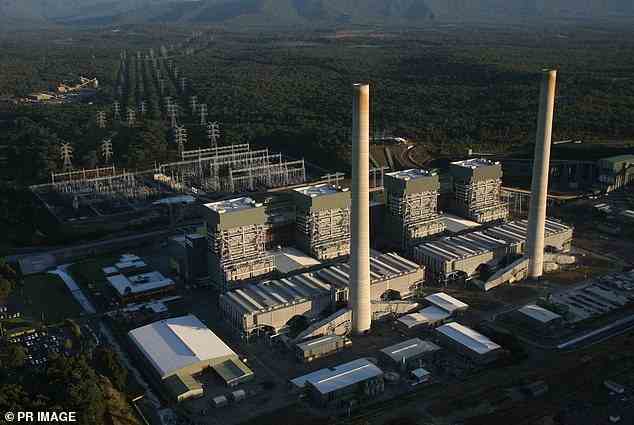
State government rejected an offer from Origin Energy in 2021 to buy Eraring coal power station – which is responsible for 25 per cent of electricity in NSW. This prompted an announcement it would close by August 2025, seven years earlier than initially anticipated
Some 484 businesses went into administration or liquidation across the country last month, up 45 per cent from the same time a year ago, according to data from the Australian Securities and Investments Commission.
The February figure represents a whopping 134 per cent increase from January this year.
And now, millions of Australians can expect residential electricity price increases of between 19.5 and 23.7 per cent depending on the state and provider.
The Australian Energy Regulator on Wednesday released its draft default market offer – essentially the maximum price that energy retailers can charge residential and small business customers – for the 2023/24 financial year.
Default offers for residential customers in NSW were expected to increase by between 20.9 per cent and 23.7 per cent, while prices would be up nearly 20 per cent in south-east Queensland and 22 per cent in South Australia.
It estimated small business customers could face price increases of between 14.7 per cent to 25.4 cent depending on their regions and providers.
For the hardest hit areas of NSW, households could see their energy bill increase by up to $463 while small businesses will see their bills rise by up to $858.
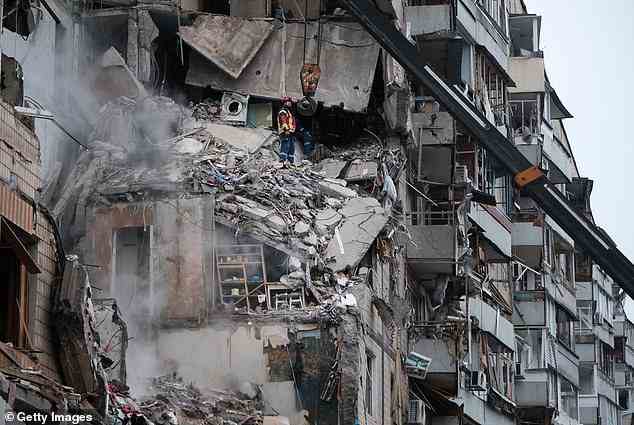
Mr Kean blamed Russia’s invasion of Ukraine for soaring costs
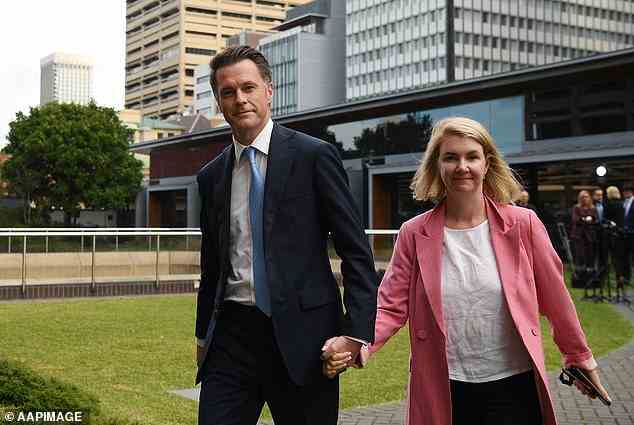
Labor’s Chris Minns has indicated he would consider buying Eraring in a bid to ease prices and avoid mass blackouts should he win the March 25 election
This comes despite a promise by Mr Kean to reduce energy prices by $130 for households and $430 for businesses this year.
Victoria’s Essential Services Commission (ESC) on Wednesday also released its default offer, which contained an even larger 30 per cent increase in household electricity prices and 31 per cent for small businesses.
The ESC said a typical household bill would rise from $1,403 to $1,829 per year, while small businesses could expect an increase from $5,620 to about $7,358.
This will impact 400,000 households across Victoria and 55,000 small businesses.
In response to the widespread changes, Queensland Premier Annastacia Palaszczuk has assured her constituents of a rebate to reduce prices.
She said: ‘Once these rebates are locked in and we see the final energy prices in May our government will go further.
‘Our government is only able to provide cost of living support to households because Queenslanders own our power assets.’
On Tuesday, Mr Kean instead introduced a new promise for NSW voters should the Liberal party be re-elected next week.
He said: ‘In the short term we are delivering $250 off families’ energy bills if they shop around for a better deal.’
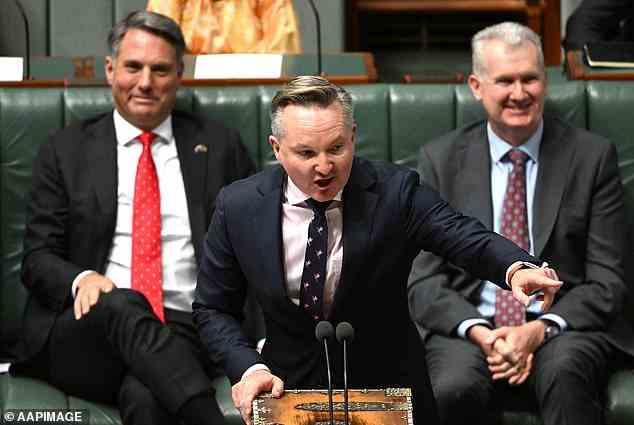
When asked about Labor’s election promise to reduce energy bills on Tuesday, Federal Minister for Energy Chris Bowen vowed not to give up on reducing prices
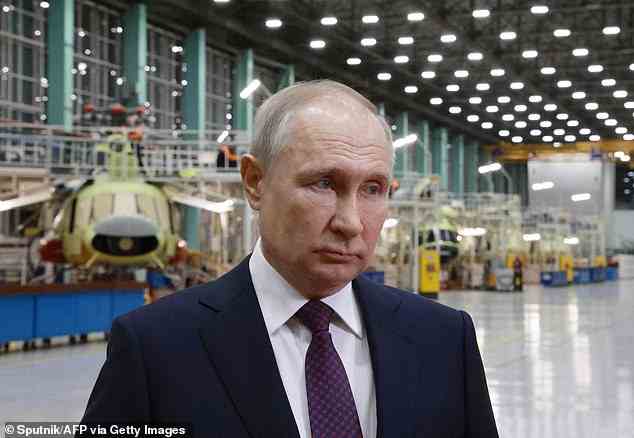
Mr Kean blamed Russia’s invasion of Ukraine for soaring costs
He went on to slam Mr Minns and the Opposition, claiming a Labor state government would ‘abandon’ voters in NSW.
‘Chris Minns has no policies of his own. The policies he does have are un-costed and will blow a big black hole on the budget.
‘Labor are just running a bottomless scare campaign because they have no plans, no policies and no ideas for the state.’
When asked about Labor’s election promise to reduce energy bills on Tuesday, Federal Minister for Energy Chris Bowen vowed not to give up on reducing prices.
‘I’m not about to give up on introducing more renewable energy because it’s the cheapest form of energy. We indicated 2025… it’s now 2023. We have a lot more work to do,’ he said.
‘We are continuing to work to lower power prices as much as possible. We’re not about to give up on that ambition.’
But Mr Bowen could not provide a clear path forward as to when Australians could expect to see that relief in their bills.
‘We’ll always be very upfront with the Australian people. There are huge international pressures which show no sign of going away,’ he said.
‘I wish and I hope that Ukraine can be victorious very soon and that’s, of course, our dear friends in Ukraine, that’s very important for them. It’s very important for people who care about political freedom anywhere and it would be very good for the world energy markets to return to normal. I can’t tell you when that’s going to happen.
‘It’s a very unstable and unpredictable environment in Europe and that’s going to continue to play out for some time to come. But what we will do is what we have done so far. Be upfront with people about the challenges and work very hard, very carefully to intervene to reduce those pressures and those impacts on Australian families.’
Mr Kean on Tuesday announced a tender process would begin next month for ‘firming infrastructure’ to keep the lights on in NSW – in a statement loaded with jargon and technical discussion of an electricity price ‘roadmap’.
Firming infrastructure means putting back-up sources in place to keep power supplied to the grid when intermittent renewable energy, such as wind and solar, lapses due to weather conditions.
Gas generators fuelled by renewable hydrogen or biogas are the planned alternative source of power generation in NSW but they will not come online until at least 2025.
And, they’ve got a much smaller capacity than the Eraring power station currently has available, sparking concerns it may not be able to match the level of demand.
But Mr Kean said there’s no concern about capacity, stating: ‘The independent body that runs the system says we will meet our energy supply targets because of the plans we have in place.
‘We’ve got a clear roadmap… which will ensure we will keep meeting our reliability standards.’
The intended green energy replacements have both announced serious delays. A gas plant being built in the town of Kurri Kurri is a year behind schedule.
Meanwhile there have been major questions over the $6billion Snowy 2.0 hydrogen/hydro project that is intended to act as a major power back-up to renewables.
Originally announced by the Malcolm Turnbull-led Coalition Government in 2017, it was supposed to have been finished in 2021 but this has been pushed out to December 2027.

